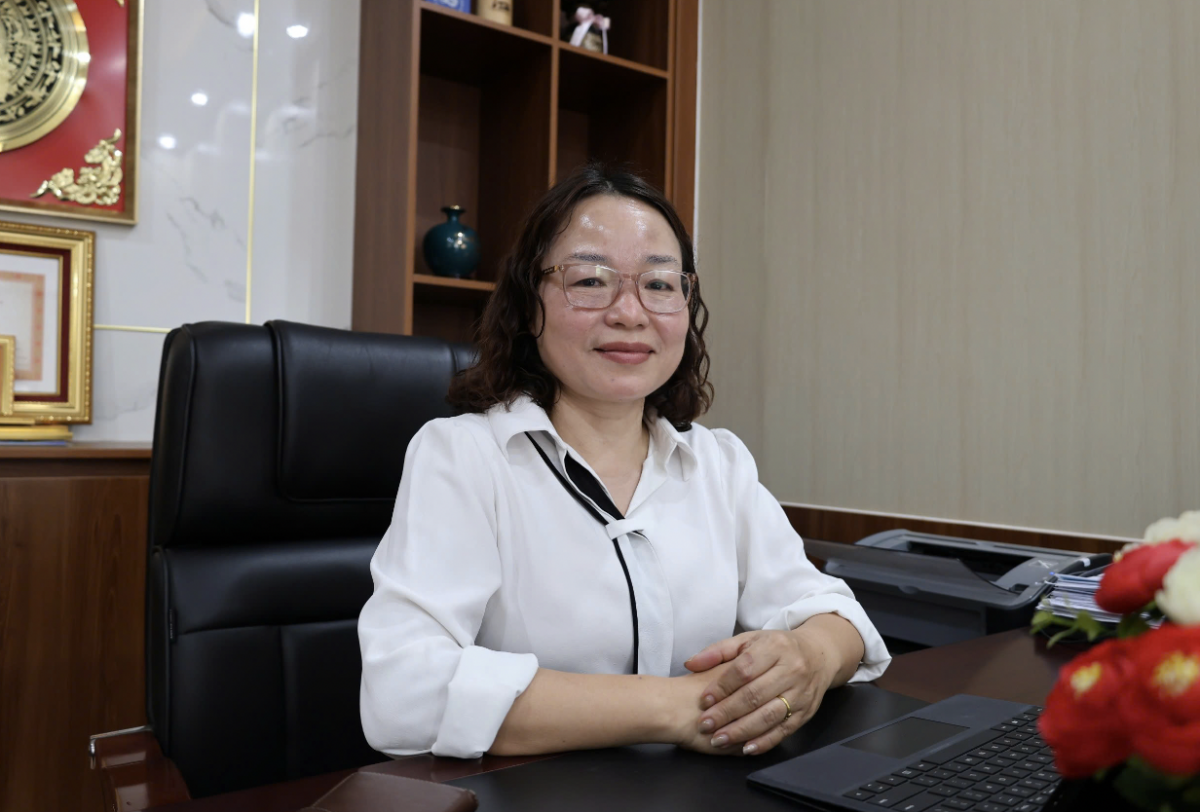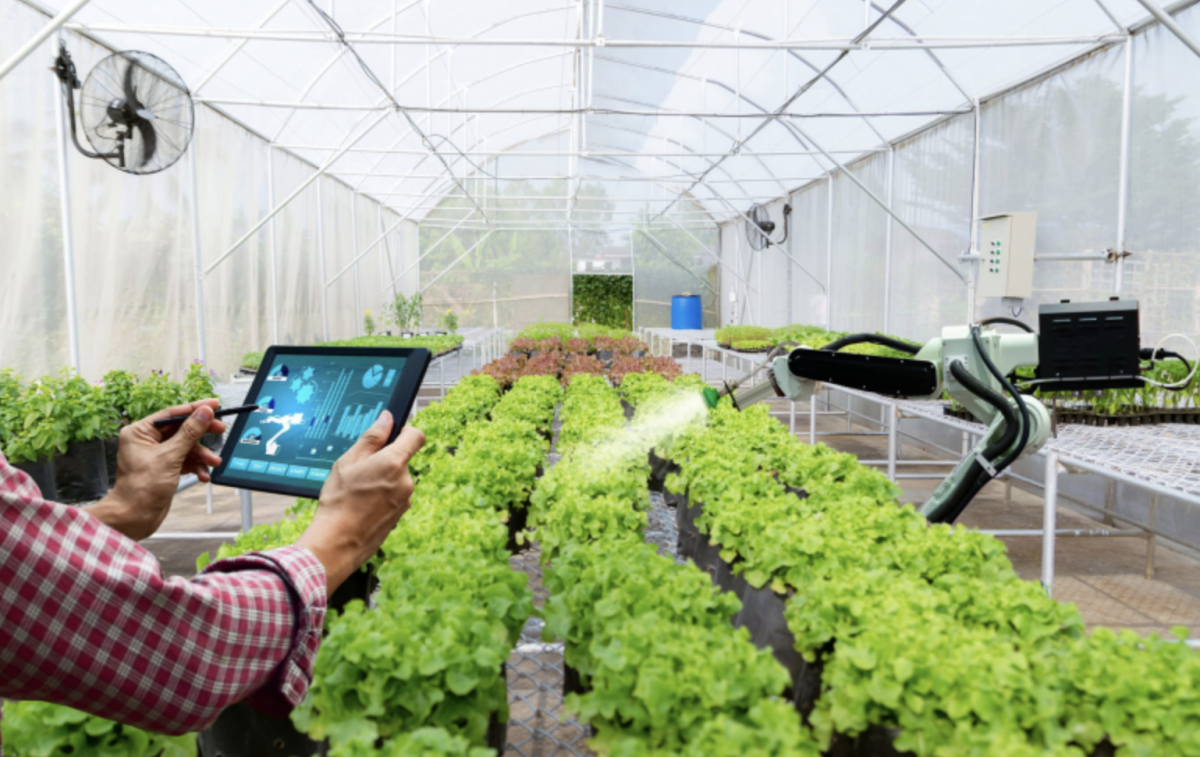Dien Bien promotes high-tech agriculture to drive development in ethnic minority areas
Vietnam Economic News’ Ngoc Hoa spoke with Chu Thi Thanh Xuan, Deputy Director of the Dien Bien Provincial Department of Agriculture and Environment to learn about Dien Bien Province’s high-tech agriculture development solutions, and how ethnic minorities are supported in the field.
 |
| Chu Thi Thanh Xuan, Deputy Director of the Dien Bien Provincial Department of Agriculture and Environment - photo: Ngoc Hoa |
Although Dien Bien doesn’t have many natural advantages and potential for agricultural development, the province has successfully developed several high-tech agricultural chains in ethnic minority areas, such as asparagus, algae, and grapes, among others. What solutions has the provincial Department of Agriculture and Rural Development implemented to achieve these results?
The application of high technology in agricultural production is an inevitable trend in the context of limited arable land, increasing demand for high-quality agricultural products, complex climate change, and the goal of export-oriented production. Dien Bien is a mountainous province with a total natural land area of 954,125.06 hectares, of which agricultural and forestry land accounts for 75.89 percent. Agricultural production land covers 120,359 hectares (12.58 percent of the total natural area), forestry land 590,031 hectares (61.7 percent), and aquaculture water surface 778 hectares (0.08 percent). Additionally, the province has about 225,594 hectares of unused land and 189,000 hectares of forest land without forests, mainly sloping land suitable for forestry production.
Given these conditions, Dien Bien’s agricultural sector has implemented comprehensive solutions to improve productivity and product quality, leveraging soil and climate potential while mobilizing resources from programs, projects, and the participation of the people and political system. Thanks to these efforts, the province's high-tech agriculture has achieved several outstanding results:
Crop production: Dien Bien has implemented agricultural production processes meeting international certifications such as Vietnamese Good Agricultural Practices (VietGAP), Global Good Agricultural Practice (GlobalGAP), organic production, and Hazard Analysis Critical Control Point (HACCP). Specifically, the certified organic agricultural area currently covers 8.5 hectares (including 5 hectares of tea and 3.5 hectares of fruit trees). In 2024, the area certified under GlobalGAP and VietGAP reached 13 hectares. Several coffee and tea processing facilities in the province have also obtained HACCP certification.
Additionally, the province has applied high technology in agricultural production, such as cultivating Spirulina algae in a closed system, propagating Cordyceps sinensis through tissue culture technology, hydroponic recirculating vegetable farming, drip irrigation, automated irrigation for fruit trees and vegetables, and seedling tray production for wet rice farming.
Currently, Dien Bien Province has 31 active safe agricultural supply chains, many of which incorporate high technology. Notable examples include the organic vegetable supply chain of the Si Pa Phin high-tech agricultural cooperative, the hydroponic vegetable supply chain of Hoa Ba Supermarket, and the organic-certified fresh fruit supply chain of CaraFarm Vietnam Company. Additionally, the province has VietGAP-certified safe tea chains, internationally organic-certified Shan Tuyet ancient tea variety, and HACCP-certified coffee chains.
Livestock and aquaculture: Dien Bien Province currently has two large-scale pig farms: Quang Lanh high-quality pig farm (9,000 pigs/year) and Huy Toan Dien Bien Co., Ltd. (6,000 pigs/year). Both farms employ closed barn models and collaborate in production-sales linkages with CP Vietnam Livestock Company and Mavin Group, aiming to produce high-quality commercial pork under VietGAHP standards. Additionally, farms have adopted manure separation technology to reduce biogas pit construction costs and protect the environment.
Regarding aquaculture development, many organizations and individuals have utilized water surfaces from irrigation and hydroelectric reservoirs for cage fish farming, with a total volume of 67,159 cubic meters, corresponding to 562 cages. High technology is also applied in intensive farming of economically valuable fish species such as monosex tilapia, American catfish, and sturgeon. Notably, cold-water aquaculture models (sturgeon and salmon) in cement tanks have diversified farmed species and increased the province's aquaculture productivity and output.
Currently, two establishments in the province have obtained VietGAP certification for tilapia farming, with a total water surface volume of 193 cubic meters and an additional 48m² of water surface area, marking significant progress in safe and sustainable aquaculture development.
Referring to forestry: Dien Bien Province has applied remote sensing GIS technology for satellite image analysis, enabling rapid detection and monitoring of forest changes to improve forest resource management. The northern mountainous province has also implemented support software programs such as FRMS Mobile, Vtools Survey, and iGeoTrans X for 120 individuals, combined with using 11 drones and handheld radios for forest patrol and inspection.
Furthermore, an automated forest fire warning system has been installed and is operating effectively, enabling timely monitoring and alerts. The province also proactively reviews suspected deforestation points using Planet satellite imagery, intensifying field inspections to ensure sustainable forest management and protection.
Regarding irrigation: The province has installed 20 automatic rain gauges to provide early warnings for natural disasters such as floods, flash floods, and landslides. Additionally, it has promoted digital transformation in the management and operation of water supply infrastructure and reservoir safety through real-time monitoring, flood forecasting, and reservoir operation software.
Dien Bien Province has also applied high technology in water-saving irrigation models covering a total area of 350 hectares. Specifically, automated irrigation systems have been deployed on 37 hectares of vegetables and fruit trees; drip and mist irrigation systems on 273 hectares (243 hectares for fruit trees and 30 hectares for vegetables); and sprinkler irrigation on 40 hectares of vegetables. These solutions ensure stable water supply, minimize waste, and reduce water loss.
 |
| High-tech agricultural models have brought tangible benefits to ethnic minority and mountainous communities in Dien Bien Province - illustration photo |
How have national target programs supported ethnic minorities in production development?
To effectively utilize the funding from national target programs, the Dien Bien Provincial Department of Agriculture and Environment has advised the provincial People’s Committee and guided districts, towns, and cities to support the development of key crops and livestock, such as coffee, macadamia, cinnamon, and strawberries. Under Subproject 2, Project 3, the province has implemented 448 support activities for production development.
Among them, 110 projects focus on value chain-linked production support, while 338 projects support community-based production development. The budget for value chain-linked projects is approximately VND250 billion, and for community-based projects, around VND200 billion. A total of 13,872 households have benefited from the program (4,095 households in value chain-linked projects and 9,777 households in community-based projects). Additionally, 17 businesses and cooperatives have participated.
How have these production models contributed to improving the livelihoods of ethnic minority and mountainous communities?
The application of high technology in production has yielded positive results, allowing crops to grow well and be harvested earlier, as seen in macadamia and cinnamon projects. The disbursed funds have been effective, creating a ripple effect and encouraging active participation of the people.
As a result, the supported crops and livestock have helped leverage local potential, aligning with the agricultural restructuring strategy, contributing to sustainable development, and ensuring stable livelihoods. This helps people escape poverty and move toward prosperity.
The average per capita income in Dien Bien Province has reached approximately VND2.2 million per month, up 9% from 2022. However, the multidimensional poverty rate in 2024 remains at 33.25%.
The adoption of high technology has enhanced agricultural productivity and quality. Advanced vegetable and fruit farming models, combined with smart irrigation methods, not only boost yields and reduce pest infestations but also ensure high-quality agricultural products, providing stable income for farmers.
In livestock farming, modern models such as closed-system pig farming and cage fish farming using advanced feed, housing, temperature and sanitation technology have minimized disease risks, and improved productivity and economic efficiency. This is particularly important for ethnic minorities and mountainous residents, helping them maintain stable production.
Additionally, many high-tech agricultural models focus on sustainable development, reducing environmental impact through the use of organic fertilizers, biological pesticides, and efficient water resource management. This not only protects nature but also ensures long-term livelihoods for local communities.
Moreover, technological advancements have helped Dien Bien’s agricultural products improve in quality and establish strong branding, including Dien Bien rice, macadamia, coffee, tea, and medicinal herbs. These products have not only increased economic value but also fostered local pride and commitment to their unique regional specialties.
In the future, the agricultural sector will continue researching and proposing advanced production solutions to enhance productivity, economic efficiency, and value for producers. Collaboration with political-social organizations and associations to promote agriculture based on local strengths will be strengthened. This approach will expand effective production models while maximizing financial resources from national programs and projects, especially national target programs, to develop export-oriented crops and livestock such as coffee, macadamia, mango, and cinnamon.
Furthermore, the province will focus on strengthening value chain-linked production for key agricultural products like high-quality rice, Shan Tuyet tea, Arabica coffee, large livestock, and poultry, emphasizing quality and sustainability. This strategy aims to increase product value while leveraging the region’s natural conditions and labor structure.
However, one of the major challenges is the limited knowledge and awareness of agricultural production among local farmers. Transitioning to new production models requires time and significant investment. While many advanced models have the potential for expansion, financial constraints among farmers and difficulties in accessing credit remain obstacles. Therefore, further policy research and development are necessary to attract investment in high-tech agriculture, support farmers in accessing capital, and create favorable conditions for production development.
Overall, high-tech agricultural models have brought tangible benefits to ethnic minority and mountainous communities in Dien Bien Province and the country as a whole. However, to ensure long-term success, continued investment in infrastructure, skill training, and financial support are essential to help farmers adopt and sustain these models effectively.
Article URL: https://ven.congthuong.vn/dien-bien-promotes-high-tech-agriculture-to-drive-development-in-ethnic-minority-areas-57113.html
Print ArticleCopyrights of Vietnam Economic News, All rights reserved VEN.VN | VEN.ORG.VN
